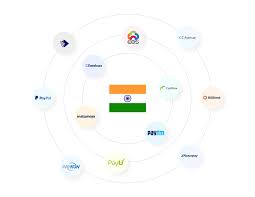India’s digital payments landscape is experiencing unprecedented growth. The Reserve Bank of India’s Digital Payments Index (RBI-DPI) recorded a 12.6% increase, reaching 418.8 in March 2024, up from 377.5 the previous year. Projections indicate that India’s digital payments market could surge from US$3 trillion to US$10 trillion by 2026.
This fast expansion underscores the critical need for businesses to adopt robust payment gateways that enhance customer experience and optimise transaction efficiency. The right payment gateway should seamlessly integrate with business operations while ensuring security, scalability and flexibility. Here is a comprehensive guide to choosing the best payment gateway for an Indian business.
Understanding the role of a payment gateway
A payment gateway is a system that enables online transactions by securely transferring payment information between the merchant, the customer and the acquiring bank. It acts as a bridge between a business’s website or app and financial institutions, ensuring a seamless checkout experience.
For businesses in India, where digital payments are rapidly evolving, choosing the right payment gateway is crucial to improving sales conversion rates and ensuring regulatory compliance.
Important factors to consider when selecting a payment gateway
- Multiple payment methods
Customers prefer diverse payment options, and a good payment gateway should support the following:
- UPI, net banking and debit/credit cards
- EMI-based payments and Pay Later options
- Mobile wallets and digital currencies
- Recurring payments for subscription-based models
A comprehensive suite of payment methods enhances customer satisfaction and maximises transaction success rates.
- Seamless integration and developer support
A superior payment gateway must integrate effortlessly with existing systems. Look for:
- Developer-friendly Application Programming Interfaces (APIs) and Software Development Kits (SDKs)
- Webhooks for real-time transaction updates
- No-code solutions for quick setup
- Customisable checkout pages to match branding
Gateways with high success rates and optimised routing, such as Plural, ensure seamless integration, reducing API failures and transaction drop-offs.
- Security and compliance
Security is crucial in digital transactions. A payment gateway should comply with:
- Payment Card Industry and Data Security Standard (PCI DSS) for data protection
- Reserve Bank of India (RBI) guidelines, including tokenisation and saved card compliance
- Advanced encryption protocols to safeguard sensitive data
- AI-powered fraud detection for risk mitigation
A secure gateway builds customer trust while ensuring business continuity.
- High success rates and reliability
Transaction failures can lead to cart abandonment. Evaluate payment gateways based on the following:
- Consistently high success rates
- Low API error rates and minimal transaction failures
- High uptime to ensure uninterrupted operations
- Real-time analytics for performance monitoring
An advanced infrastructure ensures ultra-low latency, optimised transaction routing and near-zero downtime, enhancing payment efficiency.
- Cost-effectiveness and commercials
Understanding the fee structure is critical to optimising costs. Key considerations include:
- Setup and maintenance charges
- Transaction fees and settlement costs
- Additional charges for EMI, Pay Later or cross-border payments
- Transparent commercials with no hidden fees
A payment gateway should offer the best value while maintaining high-quality service.
- Align with RBI’s Payments Vision 2025
The RBI’s Payments Vision 2025 aims to build a secure, efficient and inclusive payment ecosystem. A payment gateway should:
- Support UPI & offline payments to promote financial inclusion
- Enhance security with tokenisation & AI-driven fraud prevention
- Enable seamless cross-border transactions
- Promote interoperability across banks & financial platforms
Choosing a gateway aligned with these goals ensures long-term compliance and growth.
- Smart automation and advanced features
Modern payment gateways provide more than just transaction processing. Key features include:
- Automated payouts for vendors and employees
- Split settlements for marketplace models
- Tokenisation for seamless card-saving experiences
- Embedded finance capabilities to unlock new business opportunities
Smart automation reduces manual interventions, improving efficiency and scalability.
- Customer experience and customisation
A well-designed checkout process improves conversion rates. Businesses should prioritise gateways that offer:
- One-click payments for returning customers
- White-labelled payment pages for consistent branding
- Multi-language support to serve a diverse audience
- Mobile-friendly interfaces for a seamless payment experience
An intuitive and efficient checkout process minimises friction, reducing drop-offs and increasing customer retention.
- Industry-specific solutions
Different industries have unique payment requirements. Businesses should opt for gateways that offer tailored solutions, such as:
- Subscription-based billing for EdTech and OTT platforms
- High-volume transaction handling for e-commerce and retail
- Invoice-based payments for B2B transactions
- Instant refunds for food delivery and travel businesses
A flexible payment gateway with industry-specific customisations ensures seamless transactions and better financial management.
How a good payment gateway can help grow an Indian business
A well-chosen payment gateway drives growth by improving transaction efficiency, customer experience and revenue opportunities. Micro, Small and Medium Enterprises (MSMEs) may leverage features like faster settlements and Pay Later options, improving cash flow. Small and Medium Enterprises (SMEs) can leverage seamless integration and multi-channel payment solutions to scale operations.
Large enterprises require high-volume processing capabilities, real-time analytics and cross-border payment support. By offering 360-degree payment solutions, a good payment gateway enables businesses across sectors—including electronics, lifestyle, automobile, grocery, healthcare and hospitality—to enhance digital payment adoption and improve financial management.
Future-proofing with next-gen payment solutions
With evolving technology, businesses must adopt payment gateways that are scalable and future-ready. Key features include:
- Cloud-native infrastructure for handling high transaction volumes
- UPI-based innovations to capitalise on India’s digital payment growth
- Cross-border payment capabilities for global expansion
- AI-driven fraud prevention for enhanced security
A forward-thinking payment gateway ensures business continuity and long-term growth.
Explore the best payment gateway solutions for your business today
Choosing the right payment gateway for Indian businesses involves evaluating key factors like payment methods, integration, security and success rates. MSMEs, SMEs and enterprises should focus on reliability, scalability and cost-effectiveness for seamless operations. A trusted payment gateway like Plural aligns with RBI’s Payments Vision 2025 and offers smart automation, security and multi-channel support that can future-proof your business’s payment infrastructure.






